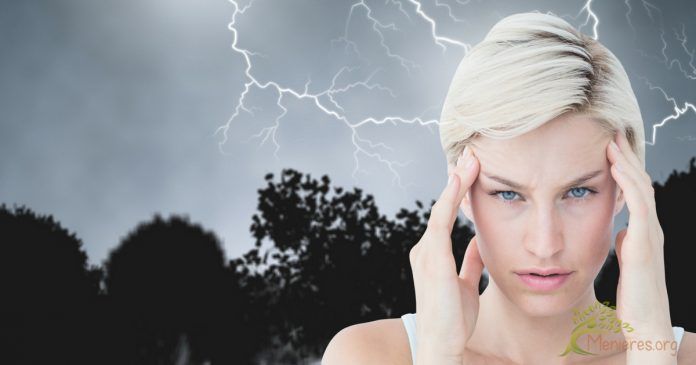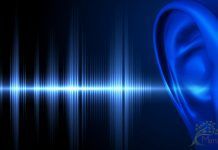
It’s hard for people to know the next step when they return from their ear-nose and throat doctors with a diagnosis of Meniere’s Disease. They tell their loved ones and get the “deer-caught-in-headlights” look that says, “I never heard of such a thing.” This response is common. Most people have never heard of Meniere’s disease symptoms or triggers, even those who have a Meniere’s diagnosis!
Meniere’s Disease Indicators

Meniere’s Disease rare, so few people have heard of it before they receive a diagnosis. Only .2 percent of the population experience Meniere’s symptoms and the condition has no known cure. Of those people, all have issues which come and go, making a firm diagnosis even more difficult.
There are four key indicators of Meniere’s:
Experiencing episodes of recurring vertigo: The sensation of spinning and dizziness in a vertigo attack are longer than what you feel when you lose balance. Some experiences last at least 20 minutes on average. Some bouts last a full day! For some, this is like having motion sickness and results in nausea and/or vomiting.
Hearing loss in one ear: The amount of hearing loss from Meniere’s varies from person to person. Sometimes the loss occurs with an attack of vertigo, then goes away., However, most Meniere’s patients have permanent hearing loss in that ear. Note, however, that up to half of Meniere’s patients develop bilateral hearing loss.
Ringing in one ear: Tinnitus is an internal experience of an unpleasant sound. What a person with tinnitus hears sounds like ringing or buzzing. Other people describe hearing whistling, hissing, buzzing, or static. In time, tinnitus can impact both ears.
Ear fullness: Have you ever gotten water in your ear? Have you ever had to unplug your ears during air travel? That’s what a Meniere’s patient experiences before, during, or after an attack.
After a Meniere’s attack, some of these indicators can disappear for weeks or even years. The patient never knows for sure when the next bout will occur. As you might imagine this causes a good deal of anxiety.
Meniere’s Disease Triggers

If you or have a Meniere’s disease diagnosis, you may feel powerless. Try to stay positive and learn about those things triggering a vertigo attack. It helps to learn what will lessen the intensity of symptoms when they occur. In reviewing triggers, remember Meniere’s affects everyone differently. A trigger for one person may not impact another. So, you’ll face trial and error as you try to figure out what triggers your symptoms.
Start a symptom diary based on known triggers. After you have an episode, write down what happened beforehand. Consider smells, food, lighting, and physical movements. Review those against the list that follows and also compare them with the history of your other attacks.
Allergies & Meniere’s
Anything producing histamine in your body can create more fluid in the ears. This fluid is one factor contributing to a Meniere’s incident. Studies in this area began in the late 1960s with ongoing reports since then. The first reports linking allergies and Meniere’s Disease occurred in 1969. Since then, there have been several reports analyzing this relationship. People with airborne allergies, along with those sensitive to mold, milk, wheat, eggs, etc, illustrate higher levels of Meniere’s diagnosis than those without.
Some physicians treating Meniere’s give patients an antihistamine. They may also suggest eliminating certain foods from your diet. Sufferers followed using these two approaches to an allergic trigger report that their symptoms decreased in severity and episodes diminished. This is not a guarantee when you have an allergy that treating it will help your Meniere’s. But, it won’t hurt how you feel in general. Ask your doctor if this approach is suitable based on your care plan.
Atmospheric Changes and Meniere’s
Since the 1980s, studies show changes in barometric pressure, temperature, and humidity trigger health problems. The corresponding issues including seizures, hearing loss, and the vestibular problems common in Meniere’s. While you can’t change the weather, you can use local weather reporting as a warning system. For example, if you’ve found a sudden change in the barometer bothers you, and there’s a forecast for barometric pressure changes, you can prepare for a Meniere’s attack. It may not happen, but if it does, you are ready with everything you need to manage symptoms onset.
Bright Lights
A sudden flash, the sun breaking free from a cloud, turning the lights on full in a dark room – these triggers have seemed to cause a Meniere’s attack in some people. Fluorescent lights are the biggest culprits, along with any lights that flicker, resulting in dizziness.
Chemical Exposure / Smells as a Meniere’s Trigger
The smell of home cleaning products sometimes contributes to Meniere’s symptoms onset. Other aromas like strong cologne or cigar smoke may also have the same effect. The key here is avoidance once you determine the cause.
Dietary Triggers for Meniere’s
Dietitians who work with Meniere’s patients recommend avoiding artificial sweetener, salt, MSG, caffeine, and alcohol just to name a few. The idea here is trying to keep the fluid levels in the inner ear at equilibrium. Salt, for example, makes our bodies retain water, and that means the fluid inside your ear may increase. The next thing you know, you’re dizzy and your ears are ringing.
The dietary limits for managing migraines apply to Meniere’s management. Illustrations include smoked meats, yogurt, figs, brie, beer, pickles, and nuts all of which contain tyramine. Tyramine sends chemicals into your bloodstream that trigger the fight or flee instinct, increasing blood pressure and stress levels.
Exertion
Physical exertion influences the immune system, and sometimes it has a negative impact. The same can happen with mental exertion. Now, knowing doesn’t mean you should never challenge yourself physically or mentally. Walking, biking, and other low impact activities often improve the way you feel and your overall attitude. The key here is balance.
Activities that burn over seven calories a minute are high-exertion activities. Mountain climbing, step aerobics, martial arts, and sports like football and downhill skiing are all examples. You don’t have to avoid these activities if they’re a beloved hobby. Just know engaging in high exertion exercise for extended periods of time may trigger vertigo or other key symptoms.
Movement Triggers and Meniere’s
Specific physical movements trigger Meniere’s Disease symptoms. These include:
- Bending down at the waist. Bend at the knees keeping your head upright instead.
- Tilting your head back. For safety in the shower, use a hand-held head so your head can remain straight.
- Sudden head movements. There’s not much you can do about this since these occur when something startles you. Over time, however, you can re-learn your reactions and move slower.
OTC (Over-the-Counter) Substances
Over-the-counter medications can trigger and worsen existing vestibular problems. Watch and track your reaction to:
- Antacids
- Aspirin
- Ibuprofen
- Smoking cessation products
Smoking
Smoking may make Meniere’s disease worse. Since the early 1960s researchers have felt that smoking may increase hearing loss. Current statistics show that 70% of smokers have increased hearing loss than those who do not smoke. Why is that?
The chemicals in cigarettes constrict blood vessels, including the vessels in your ears. Nicotine itself can bring on dizziness and tinnitus. Since these results are also symptoms of your Meniere’s, smoking cessation seems prudent.
Stress
Stress makes any condition worse. It leaves your body and mind weary and less capable of coping with illness. The difficulty for Meniere’s sufferers is stress triggers may come from the emotional problems stemming from the disease itself. Living with such uncertainty about your health isn’t easy. So, over time you get agitated, blood vessels close, and the ear fluid condition worsens.
Travel Triggers

Meniere’s patients might have a difficult time with travel. Sometimes, you already feel like you are moving even after the vehicle stops. There are things you can do for Meniere’s symptoms triggered by travel.
Transport by Vehicle: If going by car, it’s best to have another person drive for you. If that’s not possible, take someone along for the ride who understands your conditions and symptoms. Make sure the person knows what to do about a vertigo attack when one occurs.
Public Transportation: If you are on a bus or subway, make sure you’re seated. It’s best to seat yourself before movement begins. Once the source of transport moves, it can throw you off balance and you risk falling.
Preparing for Flight: If you are flying, avoid seats near the engines and try to book an aisle so you can get to the lavatory with ease. Most airlines can accommodate these requests if you explain your condition. Also, talk to your physician about any steps you need to prepare for the pressure-changing effects in your ears when the plane takes off and lands. Bring chewing gum with you and swallowing often helps passengers regulate their ear pressure.
Transport by Boat: When voyaging by sea, you can expect to face issues with balance until you get your sea legs. Try to book a room mid-ship where the moving sensation lessens. Do not attempt a long trip your first try out. When you’re on the deck, look out toward a fixed point on the horizon so your eyes don’t see as much movement. If you get sick, stay hydrated.
With all Forms of Travel: Remember to pack the medication a doctor prescribes. Or, bring an over-the-counter medicine with you to control Meniere’s symptoms! There is nothing more frustrating than trying to get a pharmacy to approve necessary items for an out-of-town situation. Don’t forget a motion sickness bag or two either.
As a passenger, no matter what form of transport you choose, you can try metered-breathing relaxation techniques to ease anxiety and stress. Also, if traveling long distances, take adequate breaks for rest and hydration; it will help you remain on top of your game.
Extra tip: When in public places, watch your footing on escalators. Also, make sure you have a solid handhold. Fix your eyes on a spot in front of you: It will help you keep focus and diminish the likelihood of a dizzy spell. If you use the elevator to move from floor to floor, hold on to the built-in handrail along the wall to help steady yourself while the elevator is in motion.
Summing It All Up: Dealing with Meniere’s Triggers

There are many potential Meniere’s triggers. Once you learn what your specific triggers are, you can avoid them to the best of your ability. These alone won’t fix your problems with the condition though. Meniere’s is a lifelong, incurable. But, what’s important here is you remember the word “incurable” doesn’t mean “unmanageable.”
Averting triggers can decrease the number of attacks you have over time. You can also have success in lessening the severity of the symptoms you experience. Couple your understanding of triggers with a healthier lifestyle, using the medications a doctor offers, a safety plan, and holistic treatments, and you can develop a solid for Meniere’s management.



